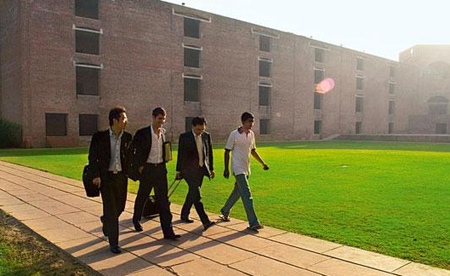 Ahmedabad, Sep 29: Indian Institute of Management Ahmedabad (IIM-A) has set itself the target of breaching the top-five club of global business schools.
Ahmedabad, Sep 29: Indian Institute of Management Ahmedabad (IIM-A) has set itself the target of breaching the top-five club of global business schools.
IIM-A's new director Ashish Nanda and chairman of board of governance AM Naik said this while talking to the media here on Saturday.
They said that they will work to make the IIM-A one of the five best management schools in the world.
The duo attributed IIM-A's decline in the rankings last year to many reasons, including dip in the salary received by graduates due to sluggish economic conditions in India.
IIM-A slipped to 19th place in the international rankings in 2013 from being in top-ten in 2010.
Professor Nanda, who took charge of the institute on September 2, said, "For us excellence in every composition of IIM-A is important, if we excel on all the parameters our ranking will improve automatically. We will not focus on improving the ranking only but we will not be blind to it".
An alumnus of 1983 batch of IIM-A, Nanda is a gold medalist both from IIT-Delhi and IIM-A. He completed his M A in Economics and PhD from Harvard University and has been teaching at Harvard Business School and Harvard Law School for the last 25 years.
"It is important to create an international brand through quality faculty and students," Naik, who is also the chairman of Larsen and Tubro, said.
An issue that needs to be looked into is faculty-to-students ratio, he said. "We have added eight faculty members taking the number to 91, we still need to have 20 or so more to make it an ideal composition."
Salaries offered to the faculty was a major issue, Naik said. "The students passing out of IIM-A get higher salary in comparison to faculty who are serving here for twenty to twenty-five years, we need to correct it," he said, urging the Union HRD ministry to consider the situation.
The institute is also in the process of restructuring the board to bring more international members.
IIM-A is hoping that the Institutes of Management Bill, presently under consideration of the Parliament, will answer these issues, the duo said.







Comments
Add new comment